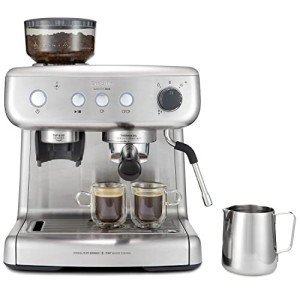The 10 Most Scariest Things About Home Use Espresso Machines

Home Use Espresso Machines: A Comprehensive Guide
Espresso machines have become a staple in numerous families as coffee lovers look for to duplicate café-quality brews in the convenience of their kitchen areas. The increase in appeal has actually resulted in a varied market filled with numerous designs, functions, and rates. This article intends to supply a useful summary of home use espresso machines, helping readers navigate their alternatives successfully.
Comprehending Espresso Machines
Espresso machines work by requiring hot water through finely-ground coffee under high pressure, leading to a focused coffee drink known as espresso. There are numerous types of espresso machines classified based upon their developing approaches and level of automation. The most typical types include:
- Manual Espresso Machines: These need the user to manage the pressure and water flow, permitting a more hands-on coffee-making experience.
- Semi-Automatic Espresso Machines: These use automatic control over water pressure, while the user manually grinds and tamps the coffee.
- Automatic Espresso Machines: With the push of a button, these machines immediately control the flow of water, making it much easier to brew espresso with constant results.
- Super-Automatic Espresso Machines: These all-in-one machines deal with grinding, tampering, developing, and even milk frothing, making them ideal for users trying to find benefit.
- Pill or Pod Machines: These use pre-packaged coffee pods to produce espresso with very little effort, however they restrict choice in developing methods and flavors.
Table: Comparison of Espresso Machine Types
| Type | Control Level | Reduce of Use | Cleaning Level | Ideal For |
|---|---|---|---|---|
| Manual | User-controlled | Moderate | High | Coffee purists |
| Semi-Automatic | Partial automation | Moderate | Moderate | Home baristas |
| Automatic | Completely automated | Easy | Low | Hectic individuals |
| Super-Automatic | Completely automated | Extremely simple | Extremely low | Convenience seekers |
| Capsule/Pod | Totally automated | Extremely simple | Very low | Casual drinkers |
Key Features to Consider
When choosing a home use espresso machine, it's necessary to consider numerous features that can significantly affect the quality of espresso and user experience.
- Pressure: Look for machines that provide at least 9 bars of pressure, as this is thought about ideal for brewing espresso.
- Boiler Systems: Single vs. dual boiler systems figure out temperature level stability and the capability to brew espresso and steam milk all at once.
- Grinder: Integrated mills enable freshly ground coffee, which boosts taste. Think about machines with adjustable grind settings.
- Milk Frother: For those who take pleasure in cappuccinos and lattes, an integrated steam wand or automatic frother is vital.
- Size and Design: Consider your cooking area area and aesthetic choices. Machines can be found in various sizes, from compact to big setups.
- Rate: Home espresso machines can vary from a few hundred to numerous thousand dollars, so it's essential to develop a budget before checking out choices.
Pros and Cons of Home Use Espresso Machines
| Pros | Cons |
|---|---|
| Convenience of developing coffee in your home | Initial financial investment can be high |
| Quality of espresso is often remarkable | Needs some ability, particularly with manual machines |
| Ability to try out flavors | Upkeep and cleaning can be labor-intensive |
| Can conserve cash in the long run | Not all machines will match every coffee preference |
Maintenance and Cleaning Tips
Maintaining an espresso machine is crucial for extending its life and guaranteeing consistent brew quality. Here are some helpful ideas:
- Regular Descaling: Minerals from water can develop in the machine. High-Quality Espresso Machines -3 months, depending upon water hardness.
- Daily Cleaning: Rinse portafilters, baskets, and steam wands after each use to avoid coffee oils from building residue.
- Use Filtered Water: This can help in reducing mineral accumulation and enhance the taste of coffee.
- Change Gaskets and Seals: These components might wear out with time and ought to be changed to preserve pressure and efficiency.
- Read the Manual: Each machine has specific care guidelines; following these will guarantee longevity.
Frequently Asked Questions About Home Use Espresso Machines
Q1: What is the best budget espresso machine? Office Espresso Machines depends on specific requirements, however designs like the DeLonghi EC155 or the Breville Bambino are popular amongst users for providing great worth. Q2: How long do home espresso machines typically last?With appropriate maintenance, home espresso machines can last anywhere from 5 to 15 years, depending upon the quality of the machine and frequency of use. Q3: Can I make coffees and lattes with any espresso machine?While most espresso machines can make coffees and lattes, having a dependable
steam wand or frother is vital for accomplishing the right milk texture.
Q4: Are super-automatic machines worth the investment?For those who focus on benefit and fast developing, super-automatic machines can be worth the investment, though they may lack some customizability in brew strength and flavor. Q5: What kinds of coffee beans are best for espresso?While personal preference plays a role, beans labeled as" espresso "blends are generally roasted darker, developing rich flavors and a velvety texture when brewed.
Purchasing a home espresso machine can change the everyday coffee routine into something special, elevating home brews to café quality. By understanding the different types of machines, essential functions to think about, maintenance needs, and weighing the
pros and cons, customers can make educated choices that fit their specific choices. As the espresso culture continues to grow, no matter the choice, every brew can be a tasty experience waiting to be enjoyed.

